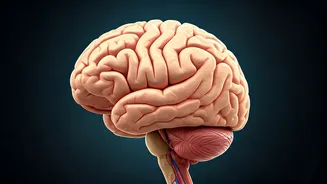Brain and Nerves
The nervous system's recovery hinges on the brain's capacity to rewire itself, a process known as neuroplasticity. Early intervention through rehabilitation
helps in retraining the brain and recovering lost functions. The severity of the effects often depends on the location and extent of brain damage. This neuroplasticity allows for remarkable improvements over time with appropriate care and therapy.
Circulatory System
The circulatory system is significantly impacted before and after a stroke. Most strokes stem from existing circulatory issues like high blood pressure, atherosclerosis, or elevated cholesterol. After a stroke, individuals face a heightened risk of subsequent strokes, heart attacks, and blood clots stemming from reduced mobility. Regular monitoring and management of cardiovascular health are essential to minimize these risks and facilitate a smoother recovery.
Muscular Effects
The muscular system depends on brain signals for movement and coordination. When a stroke disrupts these signals, muscles can weaken or become paralyzed. Paralysis or weakness commonly affects one side of the body, specifically the side opposite the brain damage. Difficulties in coordination and balance can impede walking and everyday tasks, while spasticity may cause stiff muscles or involuntary contractions. Post-stroke fatigue, a prevalent symptom, can lead to excessive tiredness, limiting physical endurance. Physical therapy, occupational therapy, and consistent exercise are vital for strengthening muscles, restoring movement, and promoting independence. Assistive devices or braces may also be utilized to help with mobility.
Digestive Changes
The digestive system is indirectly impacted post-stroke, as limited mobility and dietary shifts can disrupt normal processes. Constipation, a common issue, often results from reduced physical activity, certain medications, and dehydration. Swallowing difficulties, as noted earlier, can heighten the risk of choking or aspiration. Loss of bowel control, while less common, may cause temporary or long-term incontinence. Maintaining a diet rich in fiber, staying hydrated, and incorporating gentle movement into daily routines are beneficial for improving digestive health during recovery.
Urinary Problems
A stroke can disrupt communication between the brain and bladder control muscles, potentially leading to urinary incontinence or increased frequency. Common symptoms include a sudden or frequent urge to urinate, accidental leakage during activities like coughing or sleeping, and difficulty starting or completely emptying the bladder. Fortunately, these symptoms often improve as the brain heals over time. Bladder training, pelvic floor exercises, and, in some cases, medication can help regain control.
Reproductive Impacts
The reproductive system may be affected by the physical and emotional aftereffects of a stroke. Common effects include a reduced libido or sexual desire, erectile dysfunction in men, decreased vaginal lubrication in women, and difficulty reaching or sustaining orgasm. Addressing these issues can involve medical interventions, therapy, and supportive care to enhance the quality of life.












